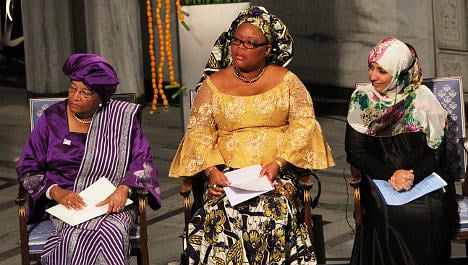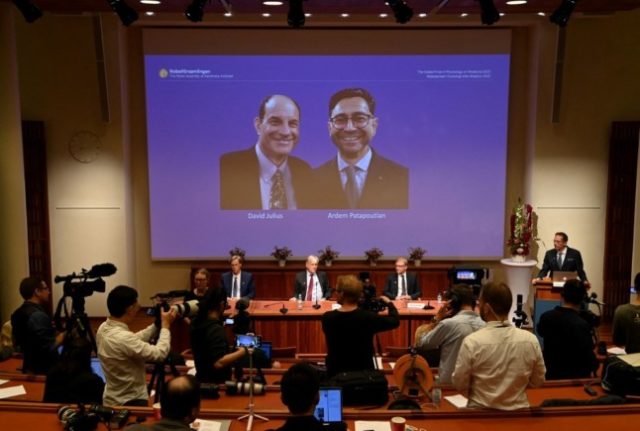"You represent one of the most important motive forces for change in today's world: the struggle for human rights in general and the struggle of women for equality and peace in particular," Norwegian Nobel Committee president Thorbjørn Jagland said before handing out the prestigious award.
Liberian President Ellen Johnson Sirleaf, Liberian "peace warrior" Leymah Gbowee and Yemen's "Arab Spring" activist Tawakkol Karman were honoured at a lavish ceremony in Oslo's city hall.
They received their gold medals and diplomas before an audience of dignitaries who included members of Norway's royal family.
Jagland said the laureates' work should serve as a warning to autocratic leaders such as those in Syria and Yemen.
"The leaders in Yemen and Syria who murder their people to retain their own power should take note of the following: mankind's quest for freedom and human rights can never stop," Jagland said.
Karman, who at 32 is the youngest person to win the Peace Prize and the first Arab woman to receive a Nobel in any category, voiced unwavering optimism that the "Arab Spring" uprisings would succeed using peaceful means.
"People can attain all their goals… by peace. You can't take down a dictatorship without peace," she told AFP after the prize ceremony.
"If they start with violence, they will end with violence."
The journalist and mother-of-three was instrumental in helping to push 33-year-ruler Ali Abdullah Saleh to agree to step down early next year.
In her acceptance speech however, Karman expressed frustration at the lack of Western support for the Yemen uprising.
"This should haunt the world's conscience because it challenges the very idea of fairness and justice," she said.
She also deplored the lack of efforts to prosecute Saleh — who only agreed to leave once promised immunity — or to prosecute those responsible for the hundreds who have died in the Yemen rebellion.
"There should be no immunity for killers who rob the food of the people."
Gbowee, a 39-year-old social worker who led Liberia's women to defy feared warlords and bring an end to her country's bloody 1989-2003 civil war, hailed the Nobel Committee for honouring their struggle.
"This prize could not have come at a better time than this; a time when global and community conversations are about how local community members and unarmed civilians can help turn our upside-down World, right-side up.
"It has come at a time when unarmed citizens — men and women, boys and girls — are challenging dictatorships and ushering in democracy and the sovereignty of people…," she said.
"It has come at a time when in many societies where women used to be the silent victims and objects of men's powers, women are throwing down the walls of repressive traditions with the invincible power of non-violence."
"Women are using their broken bodies from hunger, poverty, desperation and destitution to stare down the barrel of the gun," she added.
"This prize has come at a time when ordinary mothers are no longer begging for peace, but demanding peace, justice, equality and inclusion in political decision-making."
Gbowee, a mother-of-six, inspired Christian and Muslim women alike to wage a sex strike in 2002. They refused to sleep with their husbands until the violence ended.
"We succeeded when no one thought we would, we were the conscience of the ones who had lost their consciences in their quest for power and political positions," she said.
Sirleaf, Africa's first democratically elected woman president, who last month won a second term, also hailed the Nobel Committee's focus on women's struggles.
Referring to the conflicts in the Democratic Republic of Congo, Rwanda, Sierra Leone, Sudan, Somalia and the former Yugoslavia, and in Liberia, she spoke of "unprecedented levels of cruelty directed against women."
She welcomed the fact that international courts now acknowledged that rape was a weapon of war.
But she added: "The number of our sisters and daughters of all ages brutally defiled over the past two decades staggers the imagination, and the number of lives devastated by such evil defies comprehension."
At a separate ceremony in Stockholm on Saturday, the winners of the Nobel Prizes for Medicine, Physics, Chemistry, Literature and Economics received their prizes.



 Please whitelist us to continue reading.
Please whitelist us to continue reading.
Member comments